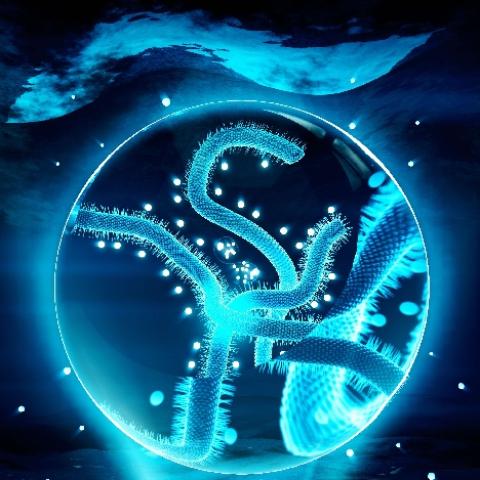Seminar | March 17 | 2-3 p.m. | 277 Cory Hall
Prof. Alexander L. Ayzner, UC Santa Cruz, Chemistry & Biochemistry
Berkeley Nanosciences and Nanoengineering Institute
There is a substantial need for soft, electronically active materials in a variety of applications, such as sensing, artificial skin, biomedical devices, and light harvesting. Water-soluble semiconducting polyions or conjugated polyelectrolytes (CPEs) have emerged as promising materials for such applications due to their attractive combination of optoelectronic and self-assembly properties. One of the more fascinating aspects of non-conjugated polyelectrolyte materials is their phase behavior, leading to a diversity of soft matter such as complex fluids, hydrogels, and viscoelastic liquids.
In this talk I will focus on our labs efforts to use phase separation of CPEs to form light-harvesting soft materials in aqueous media. We have recently shown that CPE-based complex fluids based on oppositely charged exciton-donor and exciton-acceptor CPEs give rise to highly efficient electronic energy transfer as well as a strong coupling between electronic and ionic degrees of freedom. This is attractive from a light-harvesting perspective, since the nature of the ionic environment can be used to manipulate the polyelectrolyte photophysics.
However, CPE-based viscoelastic liquids (called coacervates) have proved elusive, as the average CPEs propensity to form extensive π-stacking interactions strongly favors the solid or solid-like macrostate. The ability to form a CPE-based coacervate has intriguing light-harvesting implications: Such a state would in principle allow for substantial electronic connectivity while supporting molecular diffusion.
I will show how our lab very recently solved this problem by rationally designing a chemical series of CPEs which have for first time been demonstrated to undergo liquid/liquid phase separation in water. This insight has allowed us to form the semiconducting coacervate state. I will describe our current understanding of the mechanism that drives CPE coacervation and the emergent excitonic states that form in the process.
********
Alex Ayzner did his PhD at UCLA and postdoc at Stanford SLAC. Awards include the NSF CAREER and the Hellman Fellowship. He joined the faculty at UCSC in 2014.
victorr@eecs.berkeley.edu, 510-643-6681
Avi Rosenzweig, victorr@eecs.berkeley.edu, 510-643-6681

